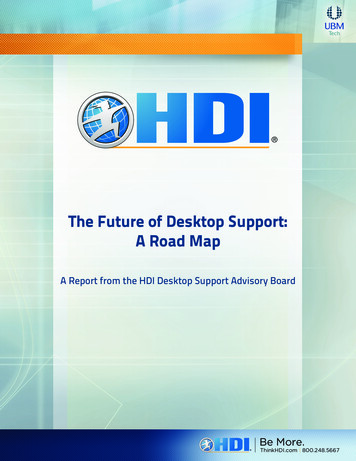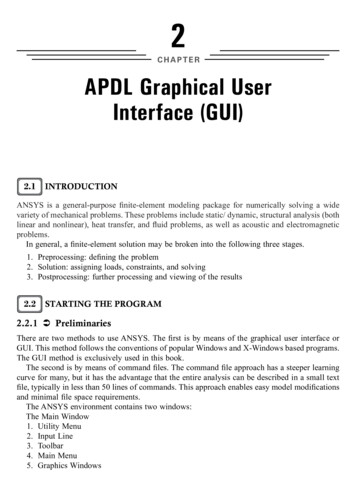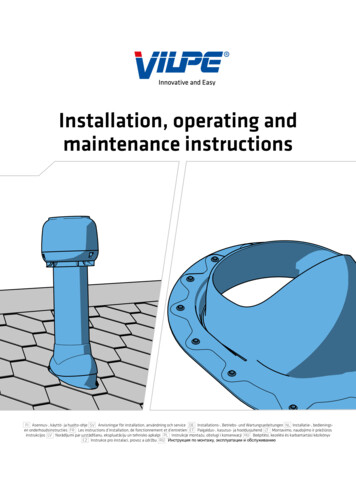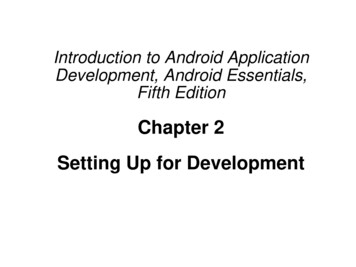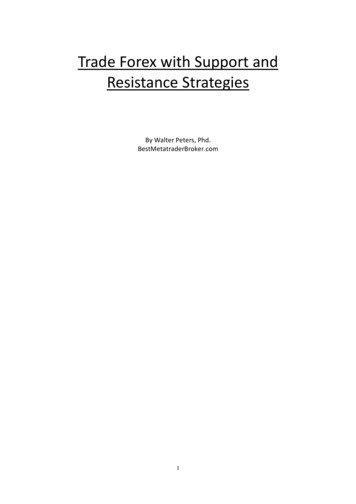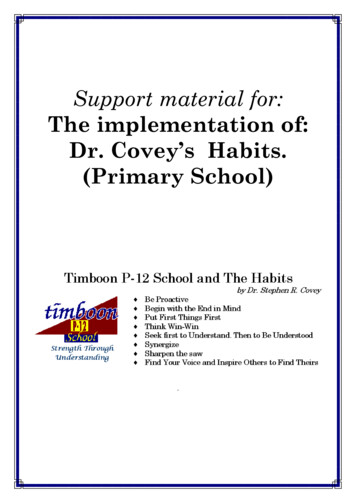
Transcription
Support material for:The implementation of:Dr. Covey’s Habits.(Primary School).
Stephen Covey's Habits of Highly Effective People Habit 1 - be proactive (Take responsibility for your life)This is the ability to control one's environment, rather than have it control you. Selfdetermination, choice, and the power to decide response to stimulus, conditions andcircumstances.Habit 2 - begin with the end in mind (Define your mission and goals inlife)Covey calls this the habit of personal leadership - leading oneself that is, towards whatyou consider your aims. By developing the habit of concentrating on relevant activities youwill build a platform to avoid distractions and become more productive and successful.Habit 3 - put first things first (Prioritize and do the most important thingsfirst)Covey calls this the habit of personal management. This is about organising andimplementing activities in line with the aims established in habit 2.Habit 4 - think win-win (Have an everyone can win attitude)Covey calls this the habit of interpersonal leadership, necessary because achievements arelargely dependent on co-operative efforts with others. He says that win-win is based onthe assumption that there is plenty for everyone, and that success follows a co-operativeapproach more naturally than the confrontation of win-or-lose.Habit 5 - seek first to understand and then to beunderstood (Listen to people sincerely)This is Covey's habit of communication, and it's extremely powerful. Covey helps toexplain this in his simple analogy 'diagnose before you prescribe'. Simple and effective,and essential for developing and maintaining positive relationships in all aspects of life.Habit 6 - synergize (Work together to achieve more)Covey says this is the habit of creative co-operation - the principle that the whole isgreater than the sum of its parts.Habit 7 - sharpen the saw (Renew yourself regularly)This is the habit of self renewal, says Covey, and it necessarily surrounds all the otherhabits, enabling and encouraging them to happen and grow.Habit 8 – Find your voice and inspire others to find theirs. (Working out what you believe in encouraging others to do the same)This is the habit about finding out why you’re here and helping others do the same. It isthe habit that allows you to climb the summit of fulfilment and achievement.
Habit 1: Be ProactiveTake responsibility for your life.Proactivity DefinedProactivity: As human beings we are responsible for our own lives. Reactive people are driven by feelings, circumstances, conditions, the environment.Proactive people are driven by carefully considered, selected and internalized values.Taking the InitiativeTaking the initiative does not mean being pushy, obnoxious, or aggressive. It does meanrecognizing our responsibility to make things happen.Habit 2: Begin with the End in MindWhat it Means To begin with the end in mind is to begin with the image of the end of your life as the frame ofreference by which everything else is measured.We may be busy, we may be efficient, but we will only be effective if we begin with the end inmind.A Personal Mission Statement The most effective way to begin with the end in mind is to develop a personal missionstatement.How to do this with children:Get them to cut pictures out of a magazine of the things they would like to achieve in life.Have them write a simple sentence about what they want to achieve: In a session In a day
In a yearFor TeachersBefore sending the children off to do their work have them talk about what the finished piece shouldlook like.Do a goal setting activity with the classRead a story about that demonstrates how someone has achieved something. E.g. Horton Hatches an eggHabit 3 – Put First Things FirstDefine the words Urgent and Important.Together students should begin to identify daily, weekly, and monthly tasks that they doand to list them on the Time Quadrant. Be careful to challenge any item listed as importantwith the following question! "Is this truly important or is it just urgent?"Discuss the meaning of each of the four titles of quadrants:Q-1 Do it now or elseQ-2 Not Urgent but importantQ-3 Do it now or else, who cares.Q-4 Procrastination / Waste timePoint out to students that when people wish to procrastinate they most often spend timedoing Q-4 activities. (watching TV, mindless surfing the net, long telephoneconversations).Successful people spend most of their time working in quadrant 2.
Time Quadrant Activity SheetUrgent means:Important means:UnimportantImportantUrgentNot UrgentDo it now or else .Not Urgent but importantTest tomorrow, Late for schoolPlanning, goal setting, exerciseDo it now or else .who cares?Procastinate/Waste timeUnimportant phone calls, peer pressureToo much TV, Time wasters.Directions:List all of the things you typically do in a week. List each thing only once and in only one quadrant.Where do you spend most of your time?Habit 4 – Think Win/WinSix Paradigms of Human ose/WinLose/LoseWinWhich Option is Best?Win/Win or No DealLose/LoseWinWin/Win or No DealWhen everyone is happy with the outcomeThere is one winner and the rest loseTo make everyone happy you lose to let others winYou cannot agree so no-one is happy with the solutionWin at all costs. Other people don't matter.Win/Win solutions have a positive outcome for everyoneIf we can't find a solution that would benefit both parties, we agree todisagree.Think up a range of situations, real or story book, that illustrate thesesituations.
Habit 5 – Seek First to Understand Then tobe Understood.Communication Communication is the most important skill in lifeIf you want to interact effectively with me, to influence me, you first need to understand me.You have to build the skills of empathic listening on a base of character that inspires openness andtrust.Empathic Listening Most people listen with the intent to reply.When another person speaks, we are usually 'listening' at one of fourlevels:o ignoringo pretendingo selective listeningo attentive listening Empathic listening means we listen with our ears, our eyes and our heart.Habit 6 – SynergizeSynergy Synergy. The whole is greater than the sum of its parts.Synergy in the Classroom Synergy is possible in the classroom when the group collectively agrees to work togethertowards the one goal. An example being the book week doors.When we open ourselves up to the influence of others, we gain new insights and facilitatethe generation of new options.Fishing for the Third Alternative In many compromise situations there is usually a third alternative.Synergistic third alternatives are often better for both parties than their original alternatives.Seeking the third alternative is a major paradigm shift from the dichotomous either/orValuing the Differences Valuing the differences is the essence of synergy.The truly effective person is able to realize the rich resources available through interactionwith the hearts and minds of other people.Conclusion You don't have to take insults personally.You can sidestep negative energy.You can look for the good in others.
You can express ideas, feelings, and experiences in a way that will encourage others to beopen also.Habit 7– Sharpen the SawOverview Habit 7 is taking the time to sharpen the saw.This is definitely a Quadrant II activity.Four Dimensions of RenewalPhysicalMentalSpiritualSocialThe Physical Dimension Involves caring effectively for our physical body.The Spiritual Dimension The spiritual dimension is your commitment to your value system and the things you believein.The Mental Dimension Surveys indicate that the television is on in most homes thirty- five to forty hours per week.Reading good literature on a regular basis is a good way to renew your mind.Keeping a journal of our thoughts, experiences, and insights is also beneficial.The Social Dimension This area of our lives is developed in our relationships with others.Habit 8– Find your voice and inspireothers to find theirsCovey sees leadership as a choice to deal with people in a way that will communicate to them theirworth and potential so clearly they will come to see it in themselves.It is about developing one's own voice, one's "unique personal significance.After finding your own voice, you can inspire others and create a classroom where people feelengaged. This includes establishing trust, searching for third alternatives (not a compromisebetween your way and my way, but a third, better way) and developing a shared vision.Teachers are masters at this habit and ensuring students pursue their interests and passions is thedifference between a teacher and a great teacher.
Resources to help with the implementation of the 7 habits.Covey CoachesAll leadership team members have had fully Covey training.All sub-schools have allocated Covey coaches.Reading Material Available in the School7 Habits of Highly Effective People by Stephen Covey7 Habits of Highly Effective Teens by Sean CoveyIntroduction to The 7 Habits of Highly Effective Teens by Sean Covey7 Habits of Highly Effective Teens Ultimate Activity Guide by Covey Foundation8th Habit by Stephen R. CoveyResource materialT:\Covey (Staff public folders)Pictures, booklet sheets, posterFilms (Your library system): Listing of Children’s books that illustrate each habit.Sample of some of the reading materialBeBegin withFirst thingsProactivethe end inFirstmindStone FoxFish is FishClassClownThe CayThePatchworkQuiltHatchetThink WinWinThe GiverSeek firsttoUnderstandSarah Plainand TallSynergizeSharpenthe SawWalk twoMoonsHortonHatchesthe eggThe longnosed pigWolfJohnnyTremainCharlotte’sWebbRamonaand hermotherThe otherdogFranklinsays sorryStorm inthe nightWhen Igrow upThe chalkbox kidBullyJust aDreamSome FrogArcticExplorerJuliusBernsteinBears: toomuchteasingThe ArtLessonChickenSundayAssistant Principal Awards and Recognition Program 2007Class of the week award:Criteria: The class that is able to define or demonstrate the “Habit of the week” accurately andwith clear understanding of the principles of the habit.Student of the week:Raffle tickets are to be given to students who do random acts of kindness.A random act of kindness is a selfless act performed by someone to either help or cheer upa someone else, for no reason other than to make people happier.Raffle tickets are to be placed in the gold box in the Assistant Principals office.Emotional bank account:When you are kind, honest, caring and friendly to another person, you make deposits on anEmotional Bank Account. However, if you are unkind, disrespectful, uncaring and mean, you drawfrom this account. Stephen Covey uses the metaphor of Emotional Bank Account to describe "theamount of trust that’s been built up in a relationship. Trust is needed for a relationship to thrive.Without trust, we may manage to accommodate and endure another person, however, it cannot bemutually satisfying in the long run. (Staff members will be privately acknowledged for theircontributions to each others emotional bank account)
7 Habits of Highly Effective Teens Ultimate Activity Guide by Covey Foundation 8th Habit by Stephen R. Covey Resource material T:\Covey (Staff public folders) Pictures, booklet sheets, poster Films (Your library system)



